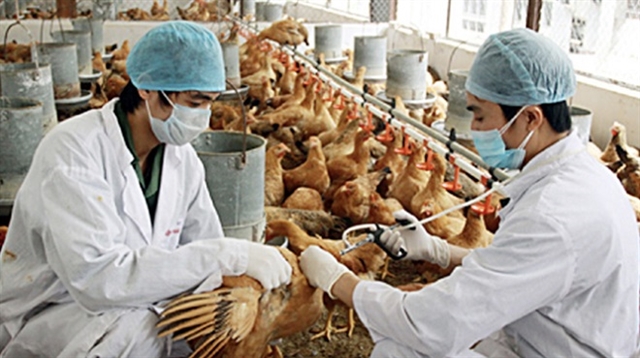 Society
Society


|
| Photo for illustration. —Photo thethaovanhoa.vn |
HÀ NỘI — The United Nations Food and Agriculture Organisation (FAO) and the World Health Organisation (WHO) in Việt Nam have issued a press release urging the Vietnamese Government and the public to keep vigilance over H5N8 human infection upon the detection of seven farm workers infected with the influenza A (H5N8) in a chicken farm in Russia, according to the Ministry of Health.
This is the first report of H5N8 poultry-to-human infection despite the virus having been circulating in poultry and wild birds since 2016. All seven human cases were asymptomatic.
To date, there is no evidence to suggest severe human infections or human-to-human transmission of this virus have occurred and this event likely represents isolated spillover of the virus from infected chickens to humans.
In Việt Nam, the Department of Animal Health (DAH) under the Ministry of Agriculture and Rural Development (MARD) has never detected the H5N8 virus. The DAH will increase testing for H5N8 virus in the national avian influenza surveillance programme starting from 2021.
“Technically the H5N8 virus shares antigenic characteristics with the H5N6 virus circulating in Việt Nam, the current avian influenza vaccine used in Việt Nam should remain effective to prevent the disease in poultry,” said Dr Pawin Padungtod, the Senior Technical Coordinator, FAO Vietnam.
“Although the risk of human infection of this specific strain of avian influenza A(H5N8) in Việt Nam is very low, we must remain vigilant and continue to practise personal protective measures against avian flu,” said Dr Satoko Otsu, Team Lead, WHO Health Emergency Programme in Việt Nam.
Bird flu infections in humans have been associated with direct contact with infected live or dead poultry.
“We should continue with our co-ordinated surveillance both at the animal and human health sectors. The public can support by reporting sick or death events in poultry as soon as possible and by practising personal protective measures,” added Dr Otsu.
Outbreaks of highly pathogenic avian influenza (HPAI) A(H5N8) have been reported in Russia, Europe, China, the Middle East and North Africa in recent months, but only in poultry and wild birds. Other strains of HPAI, such as H5N1, H5N6 and H7N9, have been transmitted to humans before.
HPAI H5N1 has killed 64 Vietnamese people since it first occurred in 2003. No human deaths have been reported since 2014, but occasional outbreaks in poultry have caused the culling of many chickens and ducks. — VNS